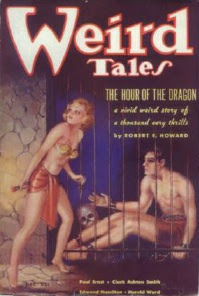The Origin of "Sword and Sorcery"
.

So much that seems obvious to us today was once quite the opposite. I was recently reading It's Down the Slippery Cellar Stairs, a 1984 Chris Drumm chapbook of R. A. Lafferty nonfiction, and came across the following passage:
But back in 1979, when the essay originally appeared, such distinctions were very muddy. The difference between high fantasy and low fantasy (a term which, like S and S, has fallen out of popular use) seemed pretty clear -- high fantasy occurred in a created world and low fantasy occurred in our own. But Lafferty, who was nobody's fool, managed to conflate sword and sorcery with high fantasy and identify them both with heroic fantasy.
This was possible because back then there wasn't a whole lot of scholarship in the science fiction genre (and what there was, tended to be resented; "let's keep science fiction in the gutter, where it belongs" being a common rallying cry) and far less in the fantasy genre. If you wanted to look up a definition of sword and sorcery, you were out of luck.
Unless, that is, you had a copy of the April 6, 1961 issue of Ancalagon .
Ancalagon was what was then known as a "crudzine" -- term pretty much self-defining -- put out by the Philadelphia Science Fiction Society. In it, there appeared a letter from Fritz Leiber, suggesting "sword-and-sorcery as a good popular catchphrase for the heroic fantasy he and fellow fans loved.
The term might well have been forgotten ( Ancalagon had a very small readership, but Philadelphia superfan (and later editor, publisher, agent, and pretty much everything else) George Scithers who got Leiber to expand upon the theme in George's prestigious heroic fantasy zine, Amra :
But why did Leiber choose Ancalagon of all publications to name a sub-genre in? I suspect he wrote more than one letter to more than one zine. That's only speculation, of course. Still . . . it might be worth your while to go through Great-Great-Granddad's stash of fanzines, just in case.
*

So much that seems obvious to us today was once quite the opposite. I was recently reading It's Down the Slippery Cellar Stairs, a 1984 Chris Drumm chapbook of R. A. Lafferty nonfiction, and came across the following passage:
Science Fiction is a collection of guerrilla bands each challenging hte rights of the others to belong to the centrality. The band most challenged by the others is 'high fantasy', sometimes called 'Sword and Sorcery'. There is a lot of stylized sneering at 'S and S'.Which is interesting because today any reasonably read fan of fantasy understands that sword & sorcery is not the same thing as high fantasy. The usefulness of the term is essentially to sort works like Michael Moorcock's Elric stories and Fritz Leiber's tales of Fafhrd and the Gray Mouser into one camp (sword and sorcery) and J. R. R. Tolkien's Lord of the Rings and George R. R. Martin's A Song of Fire and Ice into another (high fantasy). It's a useful distinction because the two groups really are engaged in distinct enterprises. The one is more playful than the other while the other is more serious than the one.
But back in 1979, when the essay originally appeared, such distinctions were very muddy. The difference between high fantasy and low fantasy (a term which, like S and S, has fallen out of popular use) seemed pretty clear -- high fantasy occurred in a created world and low fantasy occurred in our own. But Lafferty, who was nobody's fool, managed to conflate sword and sorcery with high fantasy and identify them both with heroic fantasy.
This was possible because back then there wasn't a whole lot of scholarship in the science fiction genre (and what there was, tended to be resented; "let's keep science fiction in the gutter, where it belongs" being a common rallying cry) and far less in the fantasy genre. If you wanted to look up a definition of sword and sorcery, you were out of luck.
Unless, that is, you had a copy of the April 6, 1961 issue of Ancalagon .
Ancalagon was what was then known as a "crudzine" -- term pretty much self-defining -- put out by the Philadelphia Science Fiction Society. In it, there appeared a letter from Fritz Leiber, suggesting "sword-and-sorcery as a good popular catchphrase for the heroic fantasy he and fellow fans loved.
The term might well have been forgotten ( Ancalagon had a very small readership, but Philadelphia superfan (and later editor, publisher, agent, and pretty much everything else) George Scithers who got Leiber to expand upon the theme in George's prestigious heroic fantasy zine, Amra :
I feel more certain than ever that this field should be called the sword-and-sorcery story. This accurately describes the points of culture-level and supernatural element and also immediately distinguishes it from the cloak-and-sword (historical adventure) story—and (quite incidentally) from the cloak-and-dagger (international espionage) story too!So from the very start, sword and sorcery was defined as being equivalent to heroic fantasy. Leiber did not specify it had to occur in an invented world, so it was not identical with high fantasy, a term which I suspect was invented rather later in the game.
But why did Leiber choose Ancalagon of all publications to name a sub-genre in? I suspect he wrote more than one letter to more than one zine. That's only speculation, of course. Still . . . it might be worth your while to go through Great-Great-Granddad's stash of fanzines, just in case.
*
Published on November 29, 2012 07:20
No comments have been added yet.
Michael Swanwick's Blog
- Michael Swanwick's profile
- 546 followers
Michael Swanwick isn't a Goodreads Author
(yet),
but they
do have a blog,
so here are some recent posts imported from
their feed.



